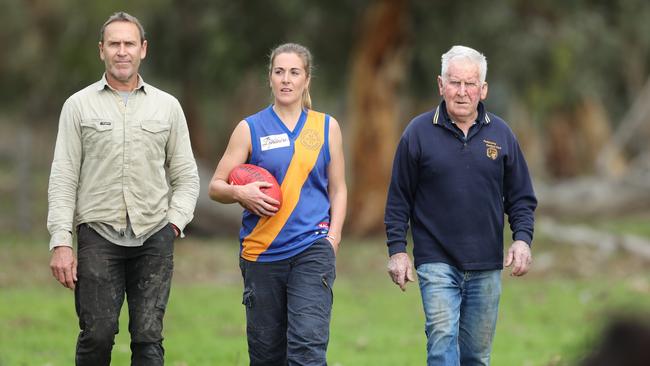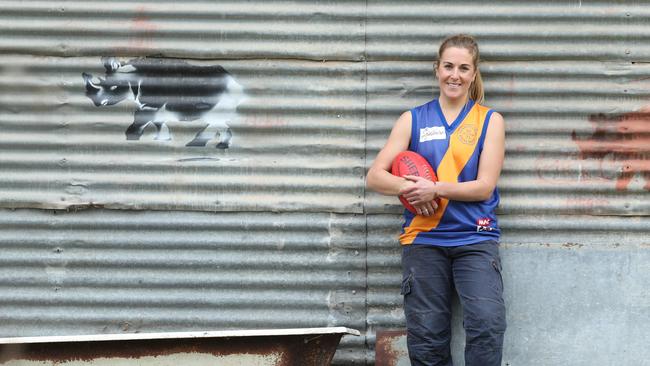Casey McElroy faces extra sanctions for playing as an unregistered player for men’s team
Casey McElory’s run with Padthaway Football Club men’s team has led to an SANFL investigation, with the outcome to be revealed on Thursday.
Local Footy
Don't miss out on the headlines from Local Footy. Followed categories will be added to My News.
Casey McElroy is set to learn if she faces sanctions for playing as an unregistered player for the Padthaway Football Club reserves side on May 25.
The SANFL has conducted its own review into the incident, which has included talking to both teams and key people in the event and is expected to hand down its findings around lunchtime on Thursday.
A spokesman for the SANFL said that as of last night the investigation had officially closed and the sporting body was determining what extra sanctions — if any — would be handed to the player.
The club itself has already been fined $1000, with another $1000 suspended, by the Kowree Naracoorte Tatiara Football League.
Under SANFL guidelines, which are endorsed nationally by the AFL, unregistered footballers are not permitted to play.
Women are unable to be registered to play in men’s competitions after the age of 14.
In the AFL’s Next Generation: Australian Football Match Policy, which outlines the conduct of the game for players aged 5-18, female participation is marked as an important aspect of the game.
“The development of a participation pathway for female participants beyond AFL Auskick is critical to the long-term growth and development of the game,” the document reads.

“Junior leagues and clubs are encouraged to offer structured youth girls competitions for female participants graduating from AFL Auskick and mixed AFL junior competitions.”
It also states: “AFL members will exclude female participants who turn 14 years by January 1 in the year of play from playing in any competition that is not a ‘female competition’.”
It goes on to say: “The philosophy of this provision is to provide ongoing opportunities for female participants in a safe environment that is appropriate to the participant’s skills and physical capacity.”
The policy, which is framed in accordance with the Sex Discrimination Act 1984, recommends that youth girls aged 13 and 14 years participate in a structured youth girls competition.
“However, if there is no youth girls competition available the following applies: In accordance with the Sex Discrimination Act 1984 (Cth) 1, people aged under 12 years of age cannot be excluded on the basis of sex or gender identity from participating in a competitive sporting activity; and
“Pursuant to section 42(1) of the Act, people of one gender aged 12 and over can be excluded from participating in competitive sporting activities in which the strength, stamina and physique of competitors is relevant.”
RULES IN PLACE FOR A REASON
Liz Walsh
Comment
Why can’t I play?
For so long, that was the catchcry of every girl who wanted to keep playing football after the age of 14.
Once upon a time, the rules meant that when girls turned 14, they weren’t allowed to play footy anymore.

So thank goodness for the rule-breakers because the advent — and rapid growth — of women’s football has handed back to Aussie girls the dream of playing footy.
On the weekend, both Casey McElory and the Padthaway Football Club asked the very question again: “Why can’t I play?”
And here comes that same old answer: Because that’s the rule.
So, does the next generation of rule-breakers stand up and say: “Let us play with the men?” Not likely.
The rule is sensible and in place for a reason.
Arguing about whether women should or shouldn’t be allowed to play with the men does little to advance the cause for equality — this now comes when women footballers are paid the same as the men.
It comes when young girls can grow up with the realistic dream of becoming full-time, professional footy players, just like every young boy does.


